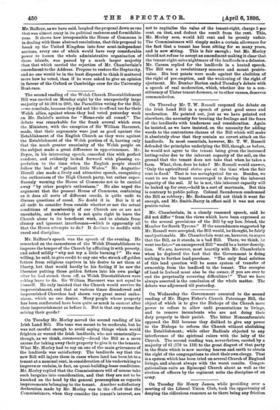On Tuesday Mr. Morley moved the second reading of his
Irish Land Bill. His tone was meant to be moderate, but he was not careful enough to avoid saying things which would frighten or wound the Irish landlords, who not unnaturally— though, as we think, erroneously—dread the Bill as a mere excuse for taking away their property to give it to the tenants. What Mr. Morley had to say on one of the main grievances of the landlords was satisfactory. The landlords say that the new Bill will injure them in cases where land has been let to a tenant at a nominal rent, in consideration of his undertaking to improve or reclaim, in fact, on quasi.building-lease conditions. Mr. Morley replied that the Commissioners will of course take such bargains into consideration, and that they are not to be knocked on the head by the general presumption as regards improvements belonging to the tenant. Another satisfactory declaration made by Mr. Morley was to the effect that the Commissioners, when they consider the tenant'a interest, are not to capitalise the value of the tenant-right, charge 5 per cent, on that, and deduct the result from the rent. This, Mr. Morley sees, would kill rent and be grossly unfair. The Commissioners will simply make a certain allowance for the fact that a tenant has been sitting for so many years, and is now sitting. This is fair enough ; but Mr. Morley should not refuse to accept an amendment making it clear that the tenant-right- sales nightmare of the landlords is a delusion. Mr. Carson replied for the landlords in a heated speech. The Bill was a revolutionary measure and meant prairie. value. His best points were made against the abolition of the right of pre-emption, and the weakening of the right of ejectment. Mr. Dunbar Barton ended Tuesday's debate with a speech of real moderation, which, whether due to a con- stituency of Ulster tenant-farmers, or to other causes, deserves commendation.






































 Previous page
Previous page